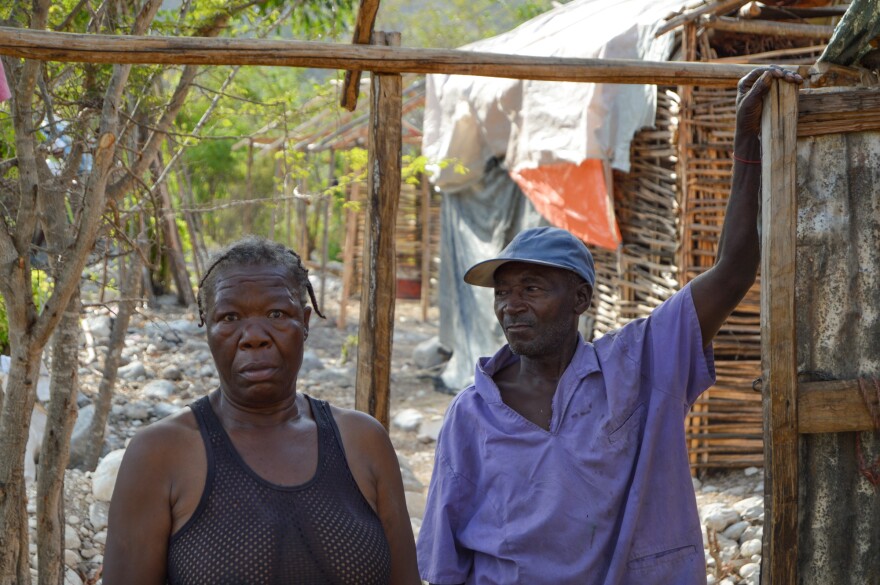Marie Etyse left two of her children behind.
She's 29, a widow and has five kids. She has lived in a town in the Dominican Republic for the past nine years.
Like many Haitian migrants, she faces deportation after a law stripped her of her citizenship. Formal deportation could start as early as Aug. 1, so many of these people have already fled to settlement camps in Haiti, which shares the island of Hispaniola with the DR.
Etyse tried to get the required papers to stay in the country.
"All the people in the process kept asking for money," she says. "They ask for money for the papers, and then the papers are no good."
So three months ago, she went to live in a camp at Tete de l'Eau.
And she said goodbye to her two young kids — temporarily, she hopes. They're staying with the family of her deceased husband.
"I couldn't travel back with all of them," she says.

At Tete de l'Eau, she stands on the bank of a bone-dry riverbed. It hasn't rained in 10 months. That rocky river bottom is the international border. And people walk back and forth. It's one of the countless unofficial crossings along the 230-mile line that separates Haiti and the Dominican Republic.
Etyse had lived just five miles past the riverbed, in a town called Black Water.

Everybody in Tete de l'Eau — currently about 400 people — has been here for at least three to six months. Most of them farmed in the Dominican Republic. But with no water or available land in the Southeast Department of Haiti, where the camp is located, that's not an option.
Charlesina Lyone thumbs the bowl of her pipe as she explains how she and her husband are living on their paltry savings. She says they're waiting on two things: God and the government.
"If we have one pot of rice, we'll separate it in two," she says. "We'll make it last twice as long."
There are at least four settlements in the southeast. A handful of NGOs register people, and the parish hands out food and blankets when it can.
The head of the Haitian Department of Civil Protection estimates at least 2,000 people have settled here during the past few months. If the Dominican government proceeds with formal deportations in the coming weeks, the numbers will only grow.
Some settlements, like Tete de l'Eau, feel like brand new villages. The structures have stick frames and walls; many have tarps for roofs. There's shade, and there's a water source. Others, less so.
The camp at Parc Cadeau, about 30 minutes south, toward the coast, feels like a refugee camp. Residents squat in tents made from sticks, plastic sheeting and cardboard. It's dusty; kids running around are coated in it. There are some 115 families.
Parc Cadeau is where we find Fefe Jean. He was born in the Dominican Republic, though he can't prove it, and came to this camp on June 29. He takes a break from cutting branches with a machete to serve as a frame for a kitchen next to his tent.
"My neighbors told me to come over here and stay for a while," Jean says. "When things calm down, I could go back."
But a return isn't likely. He says he's the color of a Haitian — the islanders believe that Haitians are significantly darker than Dominicans — and prefers Creole, the language of Haiti, to the Spanish spoken in the DR. That makes life dangerous for him in the Dominican Republic.
Copyright 2022 NPR. To see more, visit https://www.npr.org.



